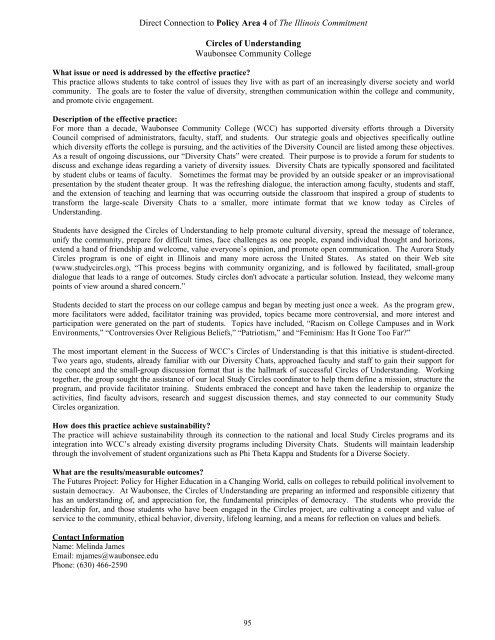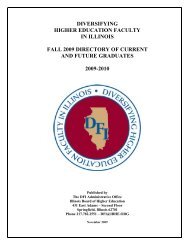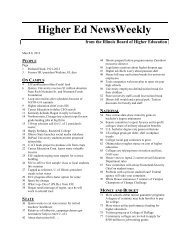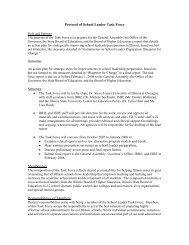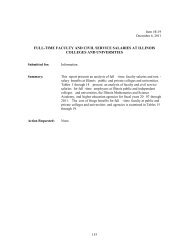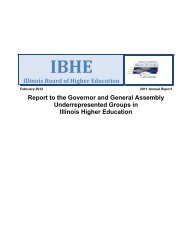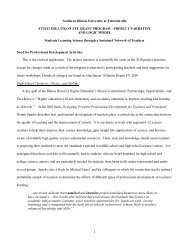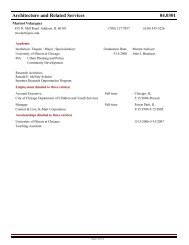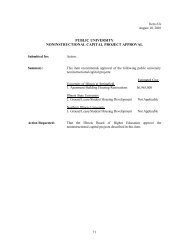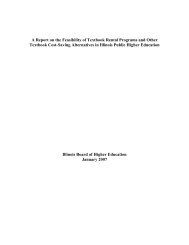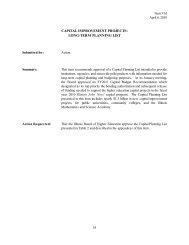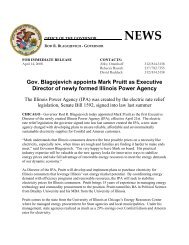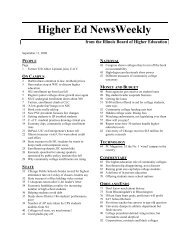Title of Effective Practice: - California Postsecondary Education ...
Title of Effective Practice: - California Postsecondary Education ...
Title of Effective Practice: - California Postsecondary Education ...
Create successful ePaper yourself
Turn your PDF publications into a flip-book with our unique Google optimized e-Paper software.
Direct Connection to Policy Area 4 <strong>of</strong> The Illinois Commitment<br />
Circles <strong>of</strong> Understanding<br />
Waubonsee Community College<br />
What issue or need is addressed by the effective practice?<br />
This practice allows students to take control <strong>of</strong> issues they live with as part <strong>of</strong> an increasingly diverse society and world<br />
community. The goals are to foster the value <strong>of</strong> diversity, strengthen communication within the college and community,<br />
and promote civic engagement.<br />
Description <strong>of</strong> the effective practice:<br />
For more than a decade, Waubonsee Community College (WCC) has supported diversity efforts through a Diversity<br />
Council comprised <strong>of</strong> administrators, faculty, staff, and students. Our strategic goals and objectives specifically outline<br />
which diversity efforts the college is pursuing, and the activities <strong>of</strong> the Diversity Council are listed among these objectives.<br />
As a result <strong>of</strong> ongoing discussions, our “Diversity Chats” were created. Their purpose is to provide a forum for students to<br />
discuss and exchange ideas regarding a variety <strong>of</strong> diversity issues. Diversity Chats are typically sponsored and facilitated<br />
by student clubs or teams <strong>of</strong> faculty. Sometimes the format may be provided by an outside speaker or an improvisational<br />
presentation by the student theater group. It was the refreshing dialogue, the interaction among faculty, students and staff,<br />
and the extension <strong>of</strong> teaching and learning that was occurring outside the classroom that inspired a group <strong>of</strong> students to<br />
transform the large-scale Diversity Chats to a smaller, more intimate format that we know today as Circles <strong>of</strong><br />
Understanding.<br />
Students have designed the Circles <strong>of</strong> Understanding to help promote cultural diversity, spread the message <strong>of</strong> tolerance,<br />
unify the community, prepare for difficult times, face challenges as one people, expand individual thought and horizons,<br />
extend a hand <strong>of</strong> friendship and welcome, value everyone’s opinion, and promote open communication. The Aurora Study<br />
Circles program is one <strong>of</strong> eight in Illinois and many more across the United States. As stated on their Web site<br />
(www.studycircles.org), “This process begins with community organizing, and is followed by facilitated, small-group<br />
dialogue that leads to a range <strong>of</strong> outcomes. Study circles don't advocate a particular solution. Instead, they welcome many<br />
points <strong>of</strong> view around a shared concern.”<br />
Students decided to start the process on our college campus and began by meeting just once a week. As the program grew,<br />
more facilitators were added, facilitator training was provided, topics became more controversial, and more interest and<br />
participation were generated on the part <strong>of</strong> students. Topics have included, “Racism on College Campuses and in Work<br />
Environments,” “Controversies Over Religious Beliefs,” “Patriotism,” and “Feminism: Has It Gone Too Far?”<br />
The most important element in the Success <strong>of</strong> WCC’s Circles <strong>of</strong> Understanding is that this initiative is student-directed.<br />
Two years ago, students, already familiar with our Diversity Chats, approached faculty and staff to gain their support for<br />
the concept and the small-group discussion format that is the hallmark <strong>of</strong> successful Circles <strong>of</strong> Understanding. Working<br />
together, the group sought the assistance <strong>of</strong> our local Study Circles coordinator to help them define a mission, structure the<br />
program, and provide facilitator training. Students embraced the concept and have taken the leadership to organize the<br />
activities, find faculty advisors, research and suggest discussion themes, and stay connected to our community Study<br />
Circles organization.<br />
How does this practice achieve sustainability?<br />
The practice will achieve sustainability through its connection to the national and local Study Circles programs and its<br />
integration into WCC’s already existing diversity programs including Diversity Chats. Students will maintain leadership<br />
through the involvement <strong>of</strong> student organizations such as Phi Theta Kappa and Students for a Diverse Society.<br />
What are the results/measurable outcomes?<br />
The Futures Project: Policy for Higher <strong>Education</strong> in a Changing World, calls on colleges to rebuild political involvement to<br />
sustain democracy. At Waubonsee, the Circles <strong>of</strong> Understanding are preparing an informed and responsible citizenry that<br />
has an understanding <strong>of</strong>, and appreciation for, the fundamental principles <strong>of</strong> democracy. The students who provide the<br />
leadership for, and those students who have been engaged in the Circles project, are cultivating a concept and value <strong>of</strong><br />
service to the community, ethical behavior, diversity, lifelong learning, and a means for reflection on values and beliefs.<br />
Contact Information<br />
Name: Melinda James<br />
Email: mjames@waubonsee.edu<br />
Phone: (630) 466-2590<br />
95


